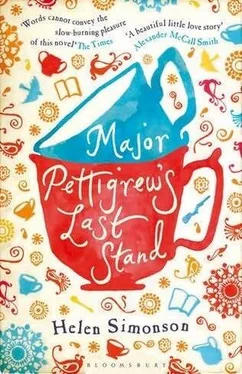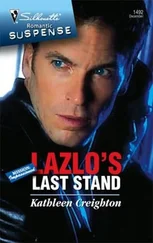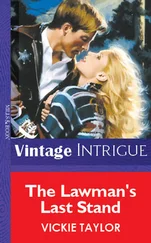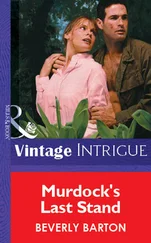“You must know that you and your friend would be perfectly welcome here at Rose Lodge,” he added.
“We talked about that,” said Roger. “I told Sandy there was plenty of room and I was sure you’d even consider sectioning off the back part of the house to make a separate flat.”
“A separate flat?” said the Major.
“But Sandy said it might look like we’re trying to shuffle you off into a granny annex and we probably should get a place of our own for now.”
“How considerate,” said the Major. Outrage reduced his voice to a squeak.
“Look, Dad, we’d really like you to come see it with us and give us your approval,” said Roger. “Sandy has her eye on some cow barn near Salisbury, too. I’d much rather be near you.”
“Thank you,” said the Major. He was well aware that Roger probably wanted money more than advice; but then, Roger was as just as likely to ask for money for the cow barn in Salisbury, so perhaps he really did want to be close to home. The Major’s heart warmed at this flicker of filial affection.
“Sussex is such an easier drive, not to mention that if I put in a few years at your golf club now, I may have a shot at membership in a serious club later on.”
“I don’t quite follow you,” said the Major. The flicker of filial love went out like a pilot light in a sudden draft.
“Well, if we go to Salisbury I’ll have to be on waiting lists for golf there. Your club isn’t considered too prestigious, but my boss’s boss plays at Henley and he said right away he’d heard of you. He called you a bunch of stubborn old farts.”
“Is that supposed to be a compliment?” said the Major, trying to catch up.
“Look, Dad, can you come and help us meet Mrs. Augerspier in Little Puddleton on Thursday?” said Roger. “We’ll just give it the once-over-nose around for dry rot and that sort of thing.”
“I have no expertise in these matters,” said the Major. “I don’t know what has potential.”
“The potential’s not the issue,” said Roger. “The issue is the widowed Mrs. Augerspier. She wants to sell the cottage to the ‘right’ people. I need you to come with us and be your most distinguished and charming self.”
“So you would like me to come and kiss the hand of the poor widow like some continental gigolo until she is confused into accepting your meager offer for a property that probably represents her entire nest egg?” asked the Major.
“Exactly,” said Roger. “Is Thursday at two good for you?”
“Three would be better,” said the Major. “I believe I have an appointment in town at lunchtime that may run on a bit.” There was an awkward silence. “I really can’t change it,” he added. It was true. Much as he was not looking forward to escorting Grace to meet Mrs. Ali’s catering friend, he had agreed to her request and could not face her disappointment if he tried to weasel out now.
“I suppose I’ll have to call and see if I can change our appointment,” said Roger. The tone in his voice said he doubted that his father had any appointments of particular importance but that he would be generous and humor the old man.
Mrs. Ali was in the living room waiting for him to bring in the tea. He stuck his head around the door and paused to notice what a lovely picture she made as she sat in the old bay window, bent over an old book of Sussex photographs. The sun, striking in through the wobbly glass, made the dust motes shimmer and edged her profile with a light gold brushstroke. She had arrived wrapped in a shawl of deep rose, which now lay draped about the shoulders of a wool crepe outfit in a blue as dark and soft as twilight.
“Milk or lemon?” he asked. She looked up and smiled.
“Lemon and a rather embarrassing amount of sugar,” she said. “And when I visit friends with gardens, I sometimes beg them for a mint leaf.”
“A mint leaf?” he said. “Spearmint? Pineapple mint? I also have some kind of invasive, purple cabbage-like oddity my wife swore was mint, but I’ve always been afraid to eat it.”
“It sounds very intriguing,” she said. “May I take a look at this strange plant?”
“Of course,” said the Major, grappling with the sudden change in program. He had been saving an invitation to see the garden in case of a sudden lapse in conversation later. If they toured the garden now, the tea might become stewed and undrinkable; and what would he do later, in the event of an interminable pause?
“Just a quick peek, so the tea doesn’t spoil,” she added as if she had read his mind. “But perhaps later I might impose on you for a more complete tour?”
“I would be delighted,” he said. “If you’d like to step through the kitchen?”
By going through the kitchen and the narrow scullery, he reasoned, they could see the side garden, which contained the herbs and a small gooseberry patch, while leaving the full vista of the back gardens to be enjoyed later, from the dining room’s French doors. Of course, there was really only a low hedge separating the two parts, but as Mrs. Ali viewed the low mounds of mints, the variegated sage, and the last few tall spikes of borage, she was kind enough to pretend not to look over the hedge at the roses and lawn.
“This must be your alien mint,” she said, bending to rub between her fingers the ruched and puckered surface of a sturdy purplish plant. “It does seem a bit overwhelming for your average cup of tea.”
“Yes, I’ve found it too pungent for anything,” said the Major.
“Oh, but I think it would be excellent for perfuming a hot bath,” said Mrs. Ali. “Very invigorating.”
“A bath?” said the Major. He fumbled to produce some further remark that might be suited to casual discussion of perfumed bathing. He understood suddenly how one could feel naked under clothes. “Rather like being a human tea bag, isn’t it?” he said. Mrs. Ali laughed and tossed the leaf aside.
“You’re quite right,” she said. “And it’s also an awful bother to pick all the soggy bits of leaves out of the drain afterward.” She bent down to pick two pale leaves of peppermint.
“Shall we go in and drink our tea while it’s fresh?” he asked. He waved his left arm toward the house.
“Oh, did you hurt your hand?” she asked.
“Oh, no, it’s nothing.” He tucked it quickly behind his back. He had hoped she wouldn’t see the ugly pink sticking plaster mashed between his thumb and forefinger. “Just gave myself a bit of a whack with the hammer, doing a little carpentry.”
The Major poured them each a second cup of tea and wished there were some way to stop the late afternoon light from traveling any further across the living room. Any moment now and the golden bars would reach the bookcases on the far wall and reflect back at Mrs. Ali the lateness of the hour. He feared she might be prompted to stop reading.
She had a low, clear reading voice and she read with obvious appreciation of the text. He had almost forgotten to enjoy listening. During the dusty years of teaching at St. Mark’s preparatory school, his ears had become numb, rubbed down to nonvibrating nubs by the monotone voices of uncomprehending boys. To them, “Et tu Brute” carried the same emotional weight as a bus conductor’s “Tickets, please.” No matter that many possessed very fine, plummy accents; they strove with equal determination to garble the most precious of texts. Sometimes, he was forced to beg them to desist, and this they saw as victory over his stuffiness. He had chosen to retire the same year that the school allowed movies to be listed in the bibliographies of literary essays.
Mrs. Ali had marked many pages with tiny slips of orange paper and, after some prompting from him, she had agreed to read from the fragments that interested her. He thought that Kipling had never sounded so good. She was now quoting from one of his favorite stories, “Old Men at Pevensey,” which was set soon after the Norman Conquest and had always seemed to the Major to express something important about the foundations of the land.
Читать дальше












